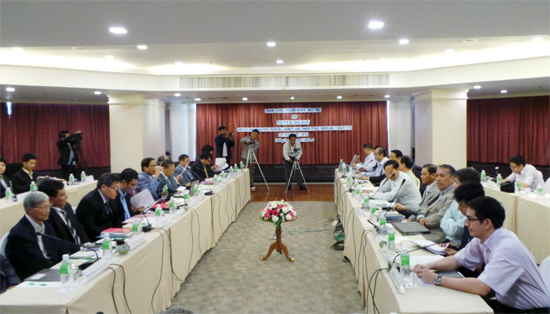After being shrouded in secrecy for months, it was disclosed at a recent meeting in Chiangmai that the long-awaited draft framework for the planned nationwide political dialogue had been presented to the Myanmar Peace Center (MPC) that serves as a technical advisory body for the government last month.
Padoh Kwe Htoo Win, one of the presenters, said U Aung Min, head of the MPC and Naypyitaw’s chief negotiator, was present at the occasion, which took place on 13 May in Rangoon.

Included in the draft entitled “Comprehensive National Peace and Ceasefire Agreement” are:
- A 15-point common principles (including Panglong Agreement, non-secession and inclusivity)
- A 14-point nationwide ceasefire accord (including establishment of Military Code of Conduct, Joint Ceasefire Committee and liaison offices)
- An 6-point framework agreement for political dialogue (including setting up of a joint National Dialogue Steering Committee and holding of National Dialogue Conference)
- A 9-point transitional arrangement (including time frame, empowerment of vulnerable groups and land reform issues)
- Scope of participation (900 participants from government, political parties and ethnic armed movements)
- A 9-point dialogue issues (including constitutional reforms, security reforms, land issues, drug eradication, IDP/refugee issues, language and cultural nights and media issues)
- Military Code of Conduct (as drafted by the Karen National Union)
“The minister (U Aung Min) said it was more comprehensive than the first two drafts,” Kwe Htoo Win, who is also General Secretary of the KNU, recounted.
Also present at the occasion were two representatives from the Restoration Council of Shan State (RCSS): Sai La and Sai Ngeun, Harn Yawnghwe, director of Brussels-based Euro Burma Office (EBO), and Hkun Htun Oo, leader of the Shan Nationalities League for Democracy (SNLD).
According to other sources:
- It was initially agreed that the national dialogue conference should be a joint undertaking
- The MPC is also drafting its own framework
“There are few differences between the Working Group for Ethnic Coordination (WGEC) and MPC drafts,” U Hla Maung Shwe, Special Advisor to the MPC, told SHAN. “The differences that need to be sorted out are mainly about the composition and the number of participants.”
The government announced in Naypyitaw on 10 June that a nationwide ceasefire agreement is to be signed after the Kachin issue is resolved and is to be followed by an all inclusive union conference.
The WGEC draft is the result of the resolutions reached at the Ethnic Nationalities Conference, 14-16 September 2012, when a 5-stage roadmap was adopted:
- Drafting of framework for political dialogue
- Negotiating and reaching agreement with the government on the draft framework
- Holding state level conferences
- Holding a inter-state conference
- Holding national conference for a national accord
The WGEC is made up of representatives from ethnic armed movements, which include member organizations of the United Nationalities Federal Council (UNFC), and civil society organizations.
Please read attachment for further details.
Attachment: Comprehensive-Union-Peace-Ceasefire-Agreement.pdf



